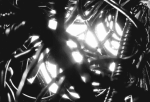Three disparate quotes. First from a recent article by Steven Erikson, then a quick quote from “The Healthy Dead”, and to finish a quote from a blog post by Scott Bakker that just appeared.
—
A theme is not a position, not a political slant, not an agenda, just as a work of honest fiction is not propaganda, polemic, or didactic diatribe. What theme is, among other things, is an area of exploration. And ‘exploration’ is a journey into the unknown, one that breaks down and discards preconceived notions. Exploration involves courage and determination, often verging on the obsessive; as many historical accounts of past explorers will attest. Your enemy is the unknown; your fear is the unknowable, and the peace that follows – if it follows – only comes when the fear goes away. Note that I do not mention wisdom, since as far as I can tell wisdom is another word for world-weary exhaustion, and every wise word uttered is born from bitter experience, and upon hearing such words, one chooses to either take heed or not. Accordingly, bitter experience breeds anew with every generation.
[…]
I have (I think) written about ruthlessness before, the force that must be turned not only upon a work of fiction (or art in general) but also upon oneself: upon one’s own most cherished beliefs. If I haven’t, well, there it is. Agendas that survive their iteration in fiction are, to my mind, evidence of failure; specifically, the author’s failure. They wrote how they want it to be, not how it is.
—
Emancipor winced, overwhelmed by a flood of guilt. ‘Can there be no second chance, Paladin?’
‘Ah, you are a saint indeed, to voice such sentiment. The answer is no, there cannot. The very notion of fallibility was invented to absolve mortals of responsibility. We can be perfect, and you can see true perfection walking here at your side.’
‘You have achieved perfection?’
‘I have. I am. And to dispute that truth is to reveal your own imperfection.’
—
Moral ambiguity and confusion are simply a fact of the human condition, one which in no way speaks to the metaphysical truth of morality. In The Second Apocalypse, the big question is simply one of what people make of this situation. Some instrumentalize it. Some flounder. Some perpetually struggle. And some–like Grin and Theo, apparently–think they have seen through the confusion. Just like the real world.
Just as genre fiction tends to offer wish-fulfillment heroes, much of it offers wish-fulfilment moral certainty as well.

